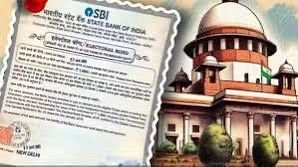The Supreme Court has received a petition seeking the confiscation of all funds received by political parties under the 2018 electoral bonds program, which the court invalidated in February of this year.
Additionally, the petitioner has asked for permission to establish a committee led by a former Supreme Court judge to investigate any illicit benefits given to donors as a quid pro quo by public authorities at the request of political parties in exchange for payments made by those parties through electoral bonds.
The plea also asked the court to order the Income Tax Authorities to reopen the assessment of all beneficiary political parties from the 2018–2019 fiscal year to the 2023–2024 fiscal year. They should also disallow any income tax exemptions that the parties claimed under Section 13A of the Income Tax Act and impose income tax, interest, and penalties on the amounts received in the form of electoral bonds.
By purchasing bearer bonds from the State Bank of India (SBI), contributors to the electoral bonds system were able to make anonymous contributions to a political party.
The Finance Act of 2017 brought it about, amending the Reserve Bank of India Act, the Income Tax Act, and the Representation of People Act, among three other acts.
A number of petitions were sent to the highest court contesting at least five changes made to several legislation by the Finance Act, arguing that these changes had allowed political parties to receive unrestricted and limitless money.
On February 15, the Supreme Court invalidated the electoral bonds program.
The plan and the changes to the Representation of People Act and the Income Tax Act that had rendered the donations anonymous had been unanimously overturned by the court.
It had ruled that the electoral bonds program violated the right to knowledge and, as a result, violated the right to free speech and expression under Article 19(1)(a) of the Constitution because of its anonymous nature.
Additionally, it had instructed the SBI to make public all electoral bond acquisition and issuance information starting in April 2019.
In compliance with that, the SBI provided all relevant information regarding the bonds that were purchased, including the identities of the political parties that made the purchases.
The petition before the top court argues that the purchase and encashment details of electoral bonds clearly demonstrated that the companies paid political parties money through electoral bonds either to avoid criminal prosecution or to obtain financial advantage through contracts or other policy matters.
“The political parties used electoral bond as a tool and method to extract money, by conferring undue advantage to corporate houses by way of compromising their criminal prosecution or granting State largesse, at the cost of public exchequer and against public interest,” the petition states.



